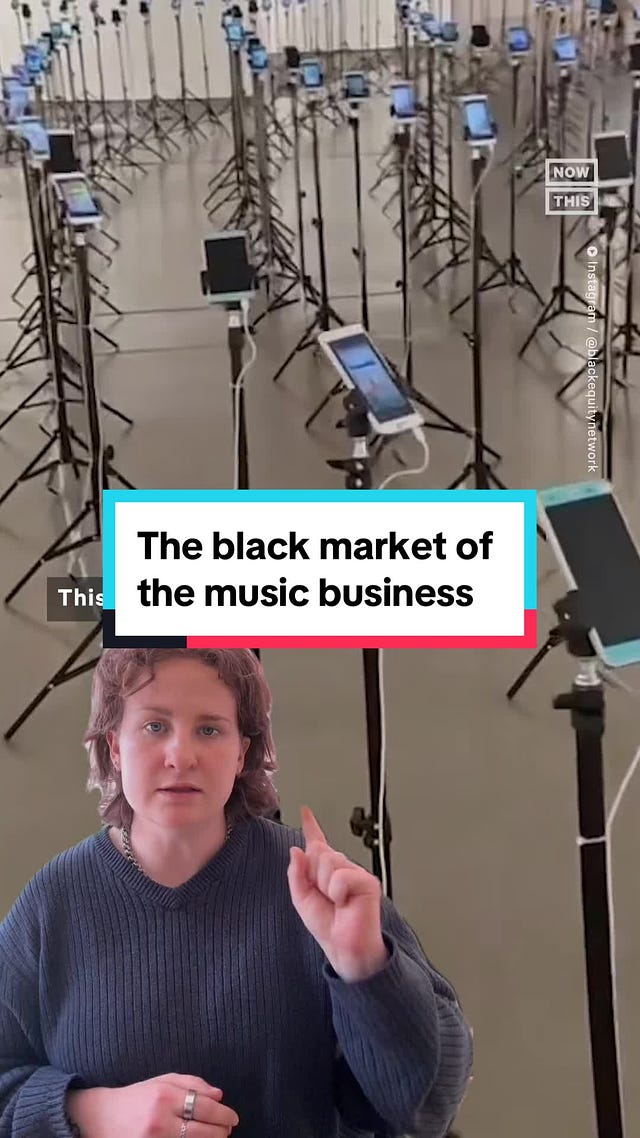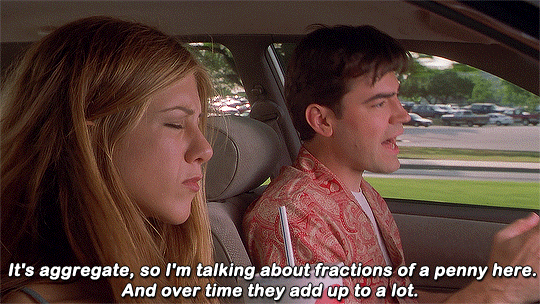Fake Streams, Real Loss, and Bad Actors
If AI Music From Sham Artists Streams to Non-Existent Fans, Does It Make Noise?
Tongues have been wagging for days about North Carolina musician Michael Smith, arrested by the FBI and indicted by the DOJ last week, who is the mastermind behind a scheme to “steal millions of dollars of musical royalties by fraudulently inflating music streams on digital streaming platforms.” This is a big deal—much more extensive than your garden variety streaming fraud as (allegedly) perpetuated regularly by residents of the music business itself:
But this time, the call wasn’t coming from inside the house. Smith is an independent musician with programming chops who concluded that the same tricks that “stream promotion” companies use—combined with exploiting flaws in the system—could scale massively. Massive scale means massive royalty payouts.
Here’s the tl;dr edition of how Smith’s scheme worked (if the entirety of the 18-page indictment is a bit much): Smith made a deal with an AI music production company (Co-Conspirator 3, aka CC3) to create roughly 10,000 AI-generated music files per month, assigning the underlying rights of each to Smith. Smith’s tech stack assigned artist names and titles to each file (for example, “Zygotic Lanie” by Calvinistic Dust), creating an illusion of credibility that these computer-generated compositions were the product of multiple human artists rather than a singular AI entity.
For those already wondering, “So, where’s the beef? Nothing to see here!” you’re right. Well, right-ish. Besides the sheer number of files, Smith paid to have created each month, who cares if he’s a wannabe computer music artist flinging as much digital pasta against the wall to see what sticks? He’s not doing anything illegal (so far), even though he’s not doing the artist or listening communities any favors by pissing in the music catalog pool. But Smith wasn’t playing the lottery, hoping a track or two might rise above the clutter and become a genuine revenue stream. He wasn’t even concerned about legitimate streaming numbers. Because his scheme involved falsifying streaming numbers via non-existent listeners on a mind-boggling scale. Over seven years, during which CC3 delivered HUNDREDS OF THOUSANDS of tracks, Smith utilized the services of a couple of digital distributors to place these songs across several streaming platforms. Then Smith leveraged his tech stack of bots, cloud services, VPNs, and fake email accounts to stream “his songs” repeatedly.
For those thinking to themselves, “I still don’t see the problem. My cousin (or daughter/sister/wife/whomever) left Taylor Swift’s latest album on repeat overnight (for weeks) because they’re such huge Swifties that they wanted to help her chart position. I don’t see the FBI busting down their doors!” There’s no need to burst your favorite Swifties bubble by telling them their efforts aren’t making a meaningful difference to Taylor’s (or anyone’s) chart position or streaming royalties. Spotify (for example) has a robust feature set to combat active and passive behaviors like this, which Spotify calls “artificial streaming.” The problem with the Swiftie argument is that those listening are legitimate streaming accounts, and real people trigger the streams. Smith’s are not. When you look at the details outlined in Smith’s indictment, the numbers are so big it’s difficult to get your head around them. It’s difficult to argue with the clever elements of Smith’s scheme. It’s also baffling as to WHY he’d email himself the details of his plan, as spelled out in the indictment:
On October 20, 2017, MICHAEL SMITH, the defendant, emailed himself a financial breakdown of how many streams he was generating each day and the corresponding royalty amounts. In the email, SMITH wrote, in substance and in part, that he had 52 cloud services accounts, and each of those accounts had 20 Bot Accounts on the Streaming Platforms, for a total of 1,040 Bot Accounts. He further wrote that each Bot Account could stream approximately 636 songs per day, and so in total SMITH could generate approximately 661,440 streams per day. SMITH estimated that the average royalty per stream was half of one cent, which 7 would have meant daily royalties of $3,307.20, monthly royalties of $99,216, and annual royalties of $1,207,128.
Not even the Swiftiest of Swifties could generate numbers that big by themselves. Even a coordinated collective of Swifties (a tangle of Swifties? a gaggle of Swifties? a murder of Swifties?) couldn’t accomplish it without blowing their cover—24/7 streaming of a 3-minute (on average) song from a single computer at best would net 480 songs per day. And Smith is only one person—a clever one—who exploited blind spots in the system to invent thousands of people, accounts, and music to take $10 million off the table.
Smith was clever but not so brilliant that he didn’t leave a trail of digital breadcrumbs. His activities were detected some time ago, and after the feds and the streaming platforms figured out HOW he was doing it, they charged Smith with wire fraud, conspiracy to commit wire fraud, and money laundering. Whether these allegations will stick as the case works its way through our criminal justice system will keep the artist, tech, and music business communities riveted, as many untested and unanswered legal issues are at play.
I’ve enjoyed discussing this topic with friends, colleagues, and clients. Everybody agrees it’s a big deal, and nobody agrees how this story will end. Admist all the excellent thought pieces, podcasts, and late-night group texts, I am troubled by something. A growing chorus of voices seeks to turn this into a David and Goliath story; the underlying facts do not make that an apt comparison. An example of the attempt to mix a word salad of arguments defending Smith’s conduct and accusing streaming services, record companies, and the Feds of heavy-handedness might read like this:
AI is bad, streaming platforms are unfair to artists, and Michael Smith is a hero for flipping over the rocks to uncover the snakes underneath—he’s a hero, not a criminal! Besides, this is a victimless crime. Spotify and the record labels make a gazillion dollars from streaming every hour but pay fractions of pennies to the artists. Who cares if some record label executive who made millions last year can’t put a second indoor swimming pool in his East Hampton summer home?

I get it—next to cable providers, phone companies, and airlines, record labels and streaming services are Most Likely to Be Villified in the superlatives section of the yearbook. Lately, in particular, Spotify hasn’t done itself any favors by reshuffling the deck on how royalties are paid to artists who fall on the lower end of the streaming ladder. So, I’m not going to defend the ethics, business practices, or perceived fairness of how any streaming platform or record label conducts itself. All have plenty to answer for, and I agree with anybody who says there’s a long way to go in building a better music ecosystem for fans and artists in the 21st Century. But there are some bad arguments, half-truths, and misperceptions amidst the technophobia, fear of change, and self-righteous indignation that the anti-label/streaming platforms torches & pitchforks crowd are selling to defend Smith’s actions.
For starters, this isn’t a victimless crime. There is a royalty pool from which that $10 million came, shared by many artists. Smith masquerading as multiple artists (many multiples, in fact) and then using bots and macros to generate 24/7 perpetual streams from thousands of fake user accounts is a parasitic attack on that pool—that’s money that should have gone to other artists. Furthermore, while Smith isn’t alone in “gaming the streams” (artists and labels try to do it all the time), this kind of fuckery only makes obtaining and analyzing accurate demand and consumption data more difficult. It also erodes trust in a system already notorious for being untrustworthy, requiring the deployment of more resources to combat systematic fraud. Smith got caught, which has the positive effect of creating awareness and heightened vigilance. But I’m reasonably confident he’s not alone in gaming the system, and half the graduating CompSci majors this year could accomplish what Smith did with an old Android phone, a glass rod, and a pith ball. He’s smart but not a genius.
Finally, fraud is a crime (ever been the victim of identity theft?), and it’s essential to separate feelings about AI, record labels, or the perceived fairness of Spotify’s payment structures from the underlying truths. Smith may have done everyone a favor in pointing out holes that need patching, but he’s no hero. And “sticking it to the man” without regard for who the fallout hurts (in this case, other artists) is the kind of posturing that falls apart quickly once you get into the details. Again, I’m not defending the big corporations here, but a point-of-view that Smith’s act of tech rebellion is a righteous takedown that only hurts a faceless company or an overpaid executive is bereft of facts, context, and critical thinking.
If you're interested in music business happenings, I highly recommend the Unlimited Supply podcast. Informative music business insights with just the right amount of wit make each episode fly faster than its already efficient seven-minute runtime. I’m not big into podcasts, but I tune into Lars daily. If you’re more of a written-word person and want to zone in on streaming, add Jeff’s Platform & Stream to your daily reading list.











I have to admit, the only reason I’m angry about this is because I didn’t think about it first.
1st time I’ve fully understood what happened here. Thanks Syd!